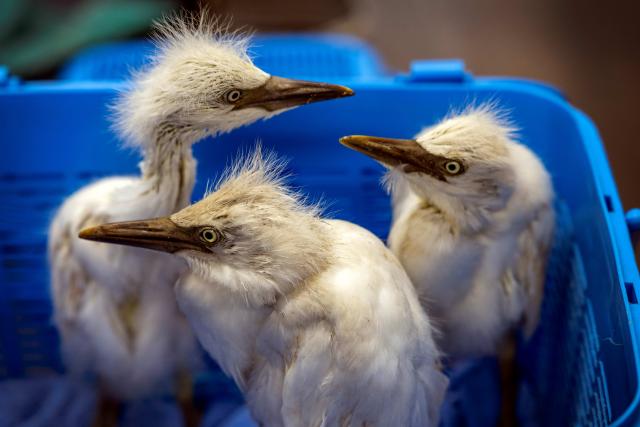The Australia Zoo Wildlife Hospital has been inundated with orphaned egrets, receiving 53 chicks in 24 hours. These adorable tiny chicks came from Lake Alfred near Gympie, as a result of the recent wild storms experienced on the Sunshine Coast. The little chicks were roosting in a tree overhanging a duck pond, when the storm hit, destroying the tree. All of the chicks fell, some sustaining severe injuries. Thankfully, a member of the public saw the chicks while out on a walk and contacted a local rescue group.
The wildlife group responded swiftly and transported all the chicks they could find to the hospital. Although a few of the chicks sustained severe injuries, the majority were lucky to survive receiving immediate care from the hospital team. The sweet little chicks range in size from just a few days old, to a couple of months, all too small to survive on their own. The tree was a popular roosting site for a number of the birds. Both parents care for the young and are extremely attentive, having up to six eggs per clutch.
Dr Tamsyn Stephenson from the Australia Zoo Wildlife Hospital has been overseeing the chicks and their treatment. Dr. Tamsyn said, “The majority of these chicks are very fortunate to not sustain any life-threatening injuries, but they will still be closely monitored over the next 48 hours. These chicks are amongst the cutest babies I have ever seen, and although it is very sad to think of what they have been through, we are so honoured to be able to give them a second chance at life”.
Over 40 of the chicks have already been assessed and transported to local wildlife carers, where they will be rehabilitated and cared for before their release. The Australia Zoo Wildlife Hospital rescues, cares and rehabilitates an average of 5000 birds every year. A few of the chicks require more love and care from the veterinarians and nurses, and will remain at the hospital for the time being.
“When they are old enough, the chicks will be released in the same spot they were found. It is truly the best part of our jobs, seeing an animal get a second chance,” Dr Tamsyn said.



![[READER COMPETITION] – Win tickets to the Queensland Ballet at The J Theatre](https://noosatoday.com.au/wp-content/uploads/2025/07/Queensland-Ballet-100x70.png)



